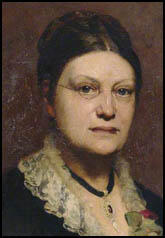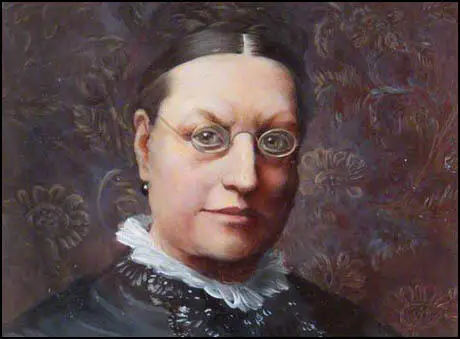Lydia Becker

Lydia Becker the daughter of Hannibal Becker, the owner of a chemical works in Manchester, and Mary Duncuft, was born on 24th February, 1827. The eldest of fifteen children, Lydia, like the rest of her sisters, was educated at home. After the death of her mother in 1855, Lydia had the responsibility of looking after her younger brothers and sisters.
Lydia developed an interest in botany and in 1864 won an award for her collection of dried plants and in 1866 her book Botany for Novices, was published. The following year Lydia founded the Manchester's Ladies Literacy Society, which despite its name was intended as a society to study scientific matters."
In 1866 Lydia heard Barbara Bodichon give a lecture on women's suffrage at a meeting in Manchester. She was immediately converted to the idea that women should have the vote and wrote an article Female Suffrage for the magazine, The Contemporary Review. Emily Davies and Elizabeth Wolstenholme were two of the women who read the article and later that year they joined with Lydia Becker to form the Manchester Women's Suffrage Committee. Wolstenholme then arranged to have 10,000 copies of the article printed as a pamphlet.
In the House of Commons the Radical MP, John Stuart Mill campaigned with Henry Fawcett and Peter Alfred Taylor for parliamentary reform and in 1866 presented the petition organised by Barbara Bodichon, Emily Davies, Elizabeth Garrett and Dorothea Beale in favour of women's suffrage. Mill, added an amendment to the 1867 Reform Act that would give women the same political rights as men. However, the amendment was defeated by 196 votes to 73.
During the debate on Mill's amendment, Edward Kent Karslake, the Conservative MP for Colchester, said in the House of Commons that the main reason he opposed the measure was that he had not met one woman in Essex who agreed with women's suffrage. Lydia Becker, Helen Taylor and Frances Power Cobbe, decided to take up this challenge and devised the idea of collecting signatures in Colchester for a petition that Karslake could then present to parliament. They found 129 women resident in the town willing to sign the petition and on 25th July, 1867, Karslake presented the list to parliament. Despite this petition the Mill amendment was defeated by 196 votes to 73.
In 1868 she became treasurer of the Married Women's Property Committee and also joined Josephine Butler in her campaign against the Contagious Diseases Acts. Becker continued to write articles about the need for parliamentary reform and in 1870 she established the Women's Suffrage Journal. Becker was also involved in other feminist campaigns.
The 1870 Education Act allowed women to vote and serve on School Boards. Lydia Becker was elected to the Manchester School Board where she took a strong interest in improving the education of girls in the city. Becker criticised the domestic education of girls in Manchester's schools and argued that boys should be taught to mend their own socks and cook their own meals.
In 1874 William Forsyth MP announced he was willing to promote a bill that would grant single, but not married women, the vote. Becker, who was unmarried, created a controversy in the suffrage movement when she supported this proposal. Although Becker only suggested this as a short-term strategy, some married suffragists, such as Emmeline Pankhurst, were outraged by her views. Later that year Becker was forced to resign from the Married Women's Property Committee.
In 1881 Becker received a letter from the Central Society for Women's Suffrage offering her the post of paid secretary of the organisation. She held the post for the next three years. Becker was elected as president of National Union of Women's Suffrage Societies (NUWSS) in 1887.
Becker's biographer, Linda Walker, has argued: "As a public speaker she lacked oratorical flair, but was noted for persuasiveness and clarity of thought; she undertook onerous lecture tours at a time when it was thought unseemly for a lady to appear on a public platform. Physically stout from early womanhood, her broad, flat face, wire-rimmed spectacles, and plaited crown of hair were a cartoonist's delight, and she was much lampooned in the popular press. However, she quickly gained recognition as the movement's key strategist, directing national policy and tactics with a statesmanlike mind: the women-only great demonstrations held throughout the country in 1880 attracted capacity crowds and enormous publicity for the cause."

By the end of 1889 Becker's health began to fail and Helen Blackburn replaced her as editor of the Women's Suffrage Journal . Becker took medical advice to visit the health resort of Aix-les-Bains. While Lydia Becker was there she caught diphtheria and died on 21st July 1890.
Primary Sources
(1) In 1867 Lydia Becker had an article, Female Suffrage, published in the Contemporary Review.
The principle of confining political privileges exclusively to one sex, though persons of both sexes are equally affected by the course pursued in deciding political questions, is now challenged, and the case must be fairly judged on its merits. The sheer novelty of the proposal is the weakest part of the case for the petitioners; the opposition will find their most formidable stronghold in taking up the position that women have never voted in choosing members of Parliament, and therefore they ought not to do so now.
(2) In 1867 Lydia Becker made a speech at a meeting of the Manchester Suffrage Society on the subject of marriage.
I think that the notion that the husband ought to have the headship or authority over his wife, is the root of all social evils… Husband and wife should be co-equal. In a happy marriage there is no question of 'obedience'.
(3) The 1870 Education Act enabled women for the first time to vote and to stand for election to local School Boards. In 1870 four women stood as candidates. Flora Stevenson in Edinburgh, Lydia Becker in Manchester, Emily Davies in Greenwich and Elizabeth Garrett in Marylebone. Elizabeth Garrett wrote a letter on 24th October 1870, explaining how she became a candidate.
This morning I had a deputation from the Working Men's Association…. I dare say when it has to be done I can do it, and it is no use asking for women to be taken into public work and yet to wish them to avoid publicity. Still I am very sorry it is necessary, especially as I can't think of anything to say for four speeches. The first of these trials is to be next week. It is a tough and toilsome business.
(4) In her book Women's Suffrage published in 1911, Millicent Garrett Fawcett described the School Board elections in 1870.
In the first School Board election, which took place in London in November 1870 Miss Elizabeth Garrett and Miss Emily Davies were returned as members. Miss Garrett was at the head of the poll in her constituency - Marylebone. She polled more than 47,000 votes, the largest number, it was said at the time, which had ever been bestowed upon any candidate in any election in England. In Manchester Miss Becker was elected a member of the first School Board, and was continuously re-elected for twenty years until her death in 1890. In Edinburgh Miss Flora Stevenson was elected to the first School Board, and was continuously re-elected for thirty-three years until her death in 1905.

